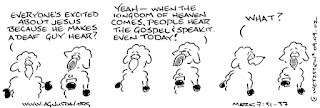Jesus Advanced in Wisdom
and Age
Reading
this passage, we can get caught up in the details of Jesus going missing (how
could that even happen?) and on Jesus’ response to Mary, and overlook three
details that Luke include in this passage.
- Luke tells us that “each year” [the family] “went to Jerusalem for the feast of Passover.” This and other details in Luke’s account of the events in his Gospel up to this point tell us that Jesus’ parents were devoted to God in their religious practices. Furthermore, they raised Jesus in the practice of the Jewish faith.
- Jesus is often portrayed in stories, paintings, etc. as lecturing the teachers. Luke, on the contrary, tells us that Jesus was a twelve-year-old, “sitting in the midst of the teachers,” learning from them by “listening to them and asking them questions.” [1]
- While the parents “did not understand what he said to them, [Jesus] went down with them and came to Nazareth, and was obedient to them.” He indeed lived as their son, “obedient to them.”
These
three elements, while often overlooked, teach us some valuable lessons for good
family life. The Holy Family of Nazareth
lived their religious faith. Jesus was obedient
to his parents. And he learned from the
wisdom and experience of his parents and others.
Then Luke concludes that in such an environment, with such attitudes, “Jesus advanced in wisdom and age and favor before God and man.”
------------------
[1] John Petty, www.progressiveinvolvement.com
Image source: www.agnusday.org





















